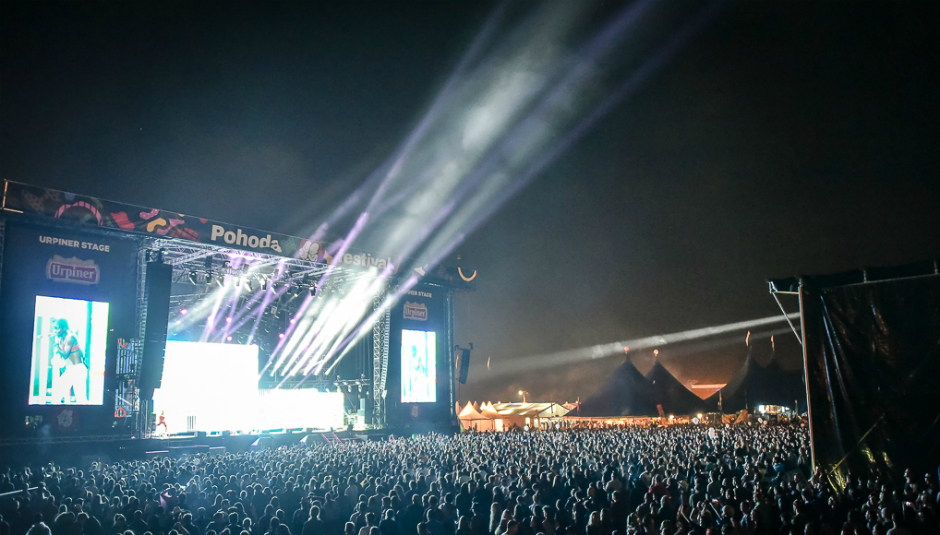There’s a moment about twenty minutes into Estonian rapping sensation Tommy Cash’s set that neatly encapsulates the madness and joy that Pohoda inspires. A girl at the front in standard boho festival uniform of flowery dress, headband, and glittery face paint has taken to dancing around while holding a cabbage aloft, onto which she has placed her sunglasses. She dances around with giddy abandon, thrusting her pale green friend in the air in time to the beat and generally having a great time. It’s just after 1pm in the afternoon, and we wonder if it’s a little early to be engaged in vegetable-based shenanigans. But, like most of the crowd who are bouncing around, she’s clear-eyed and lucid, high on nothing more than camaraderie and the euphoria of losing yourself to music, far away from the daily grind.
Over the last few years, Pohoda has deservedly earned a burgeoning reputation as one of Europe’s best-kept festival secrets. It’s not just the amazing value for money that a weekend here offers, nor is it the diverse, eclectic line-up that guarantees something for everyone year after year. It’s that at Pohoda, fan enjoyment and fun is the very ethos the whole event is geared towards. Here, there’s no feeling that you are a “customer” or “consumer”, or the sense that profit is being chased; branding is kept to a minimum, and the festival has only one major sponsor, actively shunning more corporate involvement (something that would no doubt be lucrative). It’s long been noted – by bands, fans, and fellow journalists – just how far ahead European events such as this are in terms of organization, charm, and friendliness when compared to UK counterparts, but Pohoda goes further than that; here, you’re family.
And, when you treat people with that level of respect, a funny thing happens; they reciprocate. Over three days we witness not one instance of aggression, trouble, or problematic behavior, and everywhere we go, stewards, staff, and security wear beaming grins, high fiving people, handing out water, and partaking in the revellery. Crime is virtually non-existent, and you get the feeling everyone is looking out for each other, no matter what time of day. Even crowd surfing and moshing is done in a polite, non-threatening way, strangers happy to hold people’s drinks as they go on airborne adventures or hurtling through the pit.
It’s a feeling the artists are happy to tap into. Cash, backed by nothing more than montages of his infamous videos, ramps up the midday crowd to ever higher levels of delirium, getting half the tent to crouch down on their knees before exploding at the drop. He’s a little dwarfed on the empty stage though, and while you can’t fault his energy, his “white-boy rap” shtick lacks edge and punch. At one point, he pops the cork on a bottle of champagne and attempts to drench the first few rows, but the expected shower of fizz is more of damp dribble, a rather unfortunate metaphor for his entire set. Ho99o9 - authors of last year’s craziest, most exhilarating set – are once again on the bill, and I can’t help but think what they’d make of Cash’s take on rap and hip-hop.
With the sun blazing down from blue skies, and temperatures hovering around 28 degrees, there’s a definite flow to each day. Early afternoon energy gives way to a teatime lethargy before dusk, and the onset of night, turns the revellery up another notch or three. It’s a bold move giving the likes of Cash and Princess Nokia such early slots, even if both artists, in different ways, don’t really take advantage of the packed tents their status brings. Koala Voice, a jaunty indie quartet, fare far better despite the relative openness of the Budiš Stage and, at least to begin with, a surprisingly sparse crowd. They storm through their hour playing the sort of fun, carefree indie punk that’s gloriously insouciant yet polished to perfection. Singer Manca Trampuš keeps a tight reign on their joyous tunes, killer riffs wrapping themselves around infectious melodies as the songs chug along.
But it’s Bristol band IDLES who take one look at the blazing sun and decide to fight fire with fire. Opening with ‘Mother’, their scathing, anti-Tory anthem, they rip through their set with a ferocity and anger that’s rightly seen them hailed as one of the best live acts anywhere. “Mother…FUCKER!” spits singer Joe Talbot over and over as they build to a crushing climax that’s just the opening salvo. Storming around the stage and having a running battle with the mic stand, he’s the focal point for the band’s righteous fury; guitarist Mark Bowen ends up in the audience at several points while drummer Jon Beavis batters his kit into submission. It’s exhausting just watching them, each song ramping up the energy and the antics. By then end, the stage looks like a war zone, and they depart, sweaty and unbowed, another few thousand won over by one of 2017’s most vital bands.
It’s somewhat cruel that C Duncan’s atmospheric, downtempo dreampop has to compete against the hazy, late afternoon torpor; strolling around the site, there are numerous people napping in shady corners or otherwise just hiding from the sun. For everyone else, it seems standing in front of the suntrap that is the Orange Stage is just too much effort, Duncan undeservedly drawing one of the sparsest crowds of the whole weekend. It’s a shame, for as enchanting and soothing as his music is, it requires an intimacy and a hushed reverence that’s just not possible here. He and his band are sublime, but his delicate melodies and soulful harmonics seem to evaporate in the heat, drifting upwards away from the crowd.
White Wine don’t fare much better. A manic bunch heavy on dark humour and the unexpected, singer Joe Haege has a neat line in self-depreciation and witty retorts. Not many rock bands incorporate a bassoon into so many of their songs, but then White Wine seem intent on walking the road less travelled; Haege spends much of several songs wandering amongst the crowd, singing and playing the maracas. At one point, he bumps his forehead in time to the music against the shoulder of one particularly stoic fan who’s standing stock still, arms folded. It’s sweet, but also a moment of unintentional comedy, an indie jester trying something – anything – to fight the feeling of inertia. They gently sizzle where they should burn white hot, another band defeated by the elements.
But nothing ventured, nothing gained, and it’s to Pohoda’s credit that they’re willing to book so many artists dedicated to pursuing their own vision. Local heroes The Ills – a cross between Mogwai’s soaring post-rock and Explosions In The Sky’s widescreen grandeur – are given a sunset slot on the opening night, and don’t disappoint; watching the band masterfully sail through their rich, sonic maelstrom to a backdrop of burning orange above the White Carpathians is a deeply moving experience. Slowdive are equally epic, back to claim the love and respect that was sadly denied them in their heyday. The swells and waves of guitar sound majestic, the glorious charm of their new material sitting seamlessly alongside classics such as x and x.
Slaves have attracted their fair share of online opprobrium, in part for their continuing, unapologetic defence of their name, but also due to the suspicion that they’re not being entirely sincere. Abrasive, politically-charged punk has become a crowded scene of late, the likes of Fat White Family, Sleaford Mods – who are also here, and deliver a typically minimalist yet powerful hour – and Shame leading a new wave of socially aware music. Compared to those bands, the question remains: just what are two lads called Laurie and Isaac from Royal Turnbridge Wells supposed to be angry about? Their look may be Millwall hooligan circa 1988, but they have a bounce and swagger that’s undeniably infectious and tunes that positively demand to be danced to. Fiery too, and up close and personal there’s no need to doubt their sincerity or passion.
Jazz is not something one encounters at modern festivals; outside a few, dedicated events, it seems that options are limited for bands to looking to play their way around Europe. But then TaxiWars are no ordinary jazz band. Led by the ever jovial Tom Barman, front man of dEUS, theirs is a form of indie jazz – four-minute songs, no noodling, and built around a rock sensibility. Jazz, but not as you know it. Their records are wild, glorious affairs, and in the confines of small, smoky clubs, they are electric. But here in the Európa Stage they fill the space magnificently and truly connect; saxophonist Robin Verheyen prowls around the stage, while Barman is energized like never before. The songs have a wild, gritty edge, but are also possessed of a smooth groove, expanding outward with a joy you wouldn’t necessarily expect from jazz. Nothing Barman does is ever boring, but this is fast turning out to be his most fascinating – not to mention enjoyable – project yet.
Pohoda is one of those festivals where the headliners, on their own, are not such a draw – plenty of people come back year after year for the delights to be found in all corners of the site. This year they went pop, booking Jake Bugg, Solange, and M.I.A.. The former’s acoustic crooning goes down pleasantly enough but, much like alt-J, fails to really generate any friction or passion. Both are safe and steady, if a little unexciting, and don’t really get pulses racing. That’s certainly not something that can be said about M.I.A., who’s at her spiky, ebullient best and blasts through a deafening, technicolour set. There’s slight bafflement that after a rollicking ‘Paper Planes’, and a little over 50 minutes of action, her and her crew disappear, never to return. Quizzical looks of “Is that it?” are shot back and forward, and there’s no official announcement as to why she didn’t fill her allotted hour and a half.
Solange also only plays for an hour after starting 30 minutes late, but that’s due to a downpour of biblical proportions and the threat of lightning, not a Diva-esque attitude. Her slick pop and modern R&B is a delight, the whole show richly detailed and choreographed; everyone is dressed head to toe in a vivid red, and her and her band frequently gather in a line at the front of a stage to run through some studied, elegant dance moves. Her big sister might take the headline slots at some of the world’s best-known festivals, but Solange has the presence, and the voice, to ensure that this won’t be the last time her name appears at the top of a poster.
But thrill of the weekend is a band who have worked long and hard to earn top billing, and are currently riding the crest of a wave. Pretty much everyone agrees that it’s Saturday’s one, unmissable set, and by the time Future Islands take the stage a little past 9pm, it seems that half the festival has come to watch. Mixing old favourites like ‘Tin Man’ and ‘Walking Through That Door’ with songs from this year’s The Far Field, they deliver a rollicking, joyous 90 minutes that’s pure indie-pop perfection. Hard years on the road mean they’re as tight as it’s possible to be, and the songs have a slick, lean quality. Live, they simply soar, Mike Lowry’s drumming propelling everything along just a little more urgently than on record. And, of course, at the centre of it all is Samuel T. Herring, frontman supreme. He prowls the stage, smacks his chest, and sings his heart out; all the dance moves are present and correct, and it’s not long before he’s drenched in sweat.
Looking out across a sea of thousands of contented faces, watching a band do what they were born to do, it’s hard not to be moved. Pohoda has an uncanny knack of providing more of these moments than most, which is why bands and fans keep returning, year after year. With the horror stories emanating from Y Not and Hope and Glory – both of which ended up having to cancel their Sunday program – it seems too many festival operators have lost sight of the point of all this. It’s not money. Or fame. Or empire building. It’s someone like Herring standing on a monitor soaking in the acclaim, hand raised aloft, as happy and content for the chance to perform as the masses are for being able to witness it. In that moment, everything else melts away.
For more information about Pohoda, including dates and tickets for the 2018 edition, please visit the official website.
Photo Credit: Martina Mlcuchova






















